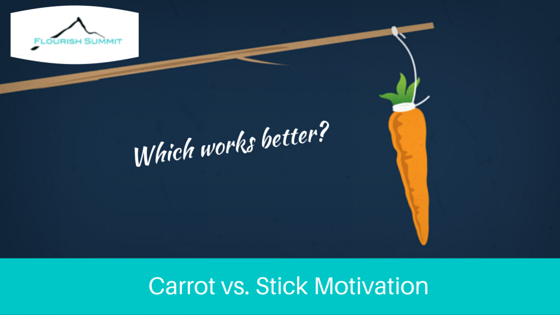There is an age-old question of what type of motivation works better. The carrot and the stick refer to that old idiom about how to get a donkey to move. It was said that you could dangle a carrot in front of him or hit him with a stick from behind, but the result ended up the same: the donkey moved forward. Do the carrot and the stick really get the same result?
This question has mainly been studied in the context of management and how to get others (employees) to do something. The Center for Advanced Research in Ann Arbor, MI, and HR consultant Towers Watson ran studies recently that showed that a high ratio of positive feedback correlates with high performance and job satisfaction. Frederick Herzberg, who researched employee motivation during the l950s and l960s, found that people are motivated by the most intrinsic factors such as interesting work, challenge, and increasing responsibility. He concluded that people have a deep-seated need for growth and achievement.
These studies apply not only to how to get others to do something but how we get ourselves to do something. People with a “stick” mindset determine their actions out of fear and avoidance of pain. They set their goals and priorities to get away from something, whether it’s debt or health challenges or loneliness. This doesn’t work well for a couple of reasons.
First of all, the unconscious mind does not deal well with negative statements. It absorbs information through images. So if you say, “I don’t want to be a loser,” it grabs the image of loser first and concentrates on that. It can’t come up with an image of “not loser” (or “not fat” or “not lonely” or “not healthy”) by itself.
The other reason is more subtle. If you motivate yourself by the fear of something bad, you’ll only get part way to a goal. For example, a dieter who loses a few pounds may feel less pain about her weight. Since the pain is lessened, she is not as motivated to keep on her diet. Think about a worker who is just motivated by “not losing her job.” How effective and creatively productive can she be?
People with a “carrot” mindset, on the other hand, move toward what they want. Because they focus consciously on the desired end, they have given their unconscious a clear image and destination to work toward. Rather than the fear and anxiety of a stick mindset (which reduces productivity and creativity), a carrot mindset generates feelings of anticipation, excitement, and possibility.
It’s interesting that the most powerfully motivating carrots are not external things like money or fame. Author Daniel Pink has reviewed decades of research on motivation. In his book, Drive: The Surprising Truth About What Motivates Us, he concludes that the key to high performance and satisfaction is our deep human need to direct our own lives, to learn and create new things, and to do something meaningful for ourselves and our world.
I think this particularly applies to unconventional thinkers who usually aren’t that impressed by normal rewards. They may achieve wealth and fame but most would tell you that those carrots weren’t the driving force behind them. Unconventional thinkers are motivated by internal drivers that are much more powerful to them.
